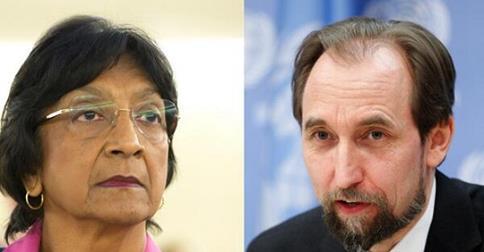My first meeting with Navanetham ("Navi") Pillay was when she was studying law while at Harvard University along with Jessica Neuwirth. Neuwirth eventually became the legal advisor at Amnesty International USA and one of the producers of the Human Rights Now music tour. Our goal was to play music all over the planet and to raise awareness and a willingness to act on behalf of human rights. It was timed to support the fortieth anniversary of the Universal Declaration of Human Rights (UDHR). It was 1988 and the apartheid regime still ruled South Africa. As such, we didn't have a concert in South Africa but instead in neighboring Zimbabwe (before the rule of Mugabe's government consolidated itself as an enemy of human rights and while it was still getting credibility as an anti-colonial freedom-fighting national government).
The influence of the tour was designed to spread across what is now called the Southern Cone of Africa. Our AI-USA team also sent free tickets to anti-apartheid student leaders in South Africa so that they might attend the concert. As we assembled our team of musicians, roadies, and others for our two full DC-10 planes, we made a point of asking a team of five particular activists to join us to give direct testimony and answer questions to enable us to learn from activists and survivors of political imprisonment and the experience of a racially tabulated system of existence. One of these five was Pillay, an accomplished jurist and lawyer from South Africa. The positions and experiences that she shared during that flight have echoed ever since. My own first up-close look at South Africa came about when I was the country director of the Peace Corps in Lesotho beginning in 1977. She and her husband Gabby had hosted my stepson for a summer break so that he too could look into the eyes of apartheid and know its effects to better see how the failure to protect human rights for all meant a failure to protect human rights for any.
Pillay had had a long and groundbreaking career already before our tour had her share her experiences. Having become the first "colored" woman to open her own law practice in what was then South Africa's Natal Province, she had been unable to enter judicial chambers due to her race classification under the regime. She spent her time defending anti-apartheid activists and fought unfair detention and the use of abusive conditions for nearly three decades. Notably, it was her representation that created the ability for political prisoners on the notorious Robben Island (including Mandela himself) to have access to their attorneys. She sued to prevent her husband from being interrogated using extra-judicial "techniques." She was an early leader in the creation for shelters for survivors of domestic violence and helped created an equality clause in the South African post-apartheid constitution that prohibits discrimination on the basis of race, religion, and sexual orientation, a clause that continues to be ahead of the typical in international jurisprudence. In 1992, she was a co-founder of Equality Now with Feryal Gharahi and Jessica Neuwirth, all lawyers who joined forces to advance the recognition that violence against women was a violation of the UDHR.
In 1995, Nelson Mandela sent Pillay to the South African High Court, which allowed her to experience the first time that she'd entered judicial chambers when she entered her own. Very quickly, she was elected by the United Nations' General Assembly to serve on the International Criminal Tribunal for Rwanda, where she helped to landmark the notion that war rape is a form of genocide and not "merely" a correlate to warfare. A subsequent founding member of the International Criminal Court in 2003, she resigned in 2008 to take up her position as High Commissioner for Human Rights.
Pillay was nominated in 2008 and her nomination was initially opposed by the United States due to her support for real freedom for women's reproductive rights among other "concerns." After such opposition was dropped she was given not only the typical four-year term but had things renewed for an additional two-year term. That term is soon coming to an end and her mark on the United Nations is difficult to adequately describe in both her systematic pursuit of "traditional" human rights in the face of notable political opposition and her willingness to pursue new ways to make implicit human rights more explicit. Without the leadership of Navi Pillay, the horrors of Sri Lanka's discrimination against Tamils and Muslims would be much less visible, the disgusting attempts at genocide against the Rohingya in western Burma would be less covered in the media, and there would still be no United Nations recognition of the human rights imperatives for LGBT protections.
The successor for the position is Jordan's Prince Zeid, and these are very difficult shoes for him or anyone to fill. But the United States has a not inconsiderable voice at the United Nations. Call your Representative and Senator (see www.contactingthecongress.org) now and ask them to ask Prince Zeid to support the full breadth of rights. Navi Pillay bravely and correctly read the rights implicit to gender, orientation, disability, and economic rights and the world has every right to expect all the United Nations clout to maintain that line. We hope that Zeid is prepared to be as inclusive and courageous as Pillay in mandating the truly universal nature of the Universal Declaration of Human Rights for all of the planet. Afterwards, we strongly suggest that you consider a note to the United Nations' High Office of the High Commission for Human Rights directly at infodesk@ohchr.org to thank Navi Pillay for her strong voice and support for human rights for all peoples as well as wishing the next High Commissioner the very best. We wish her hope and the very best wishes in whatever she might choose to do next and know that all the world's peoples will find solidarity in her inclusive voice.

